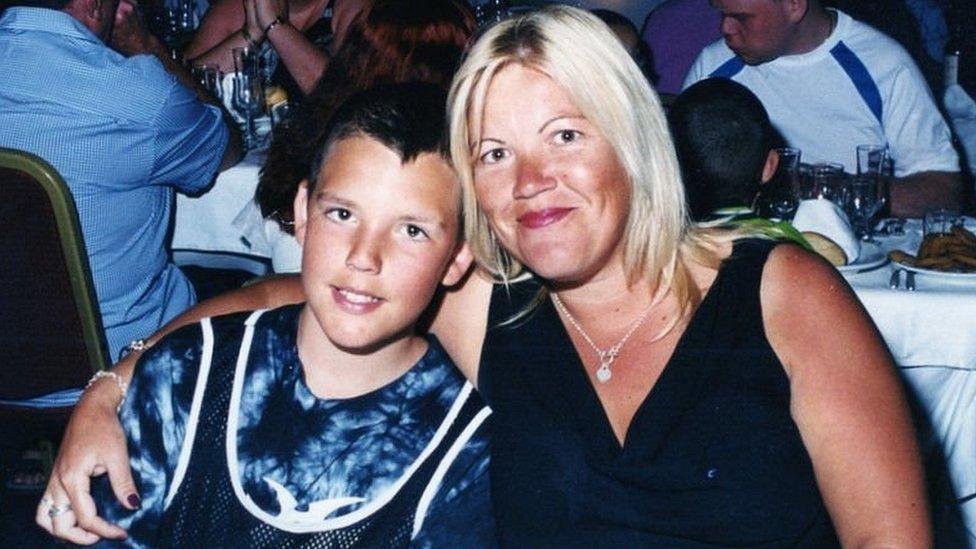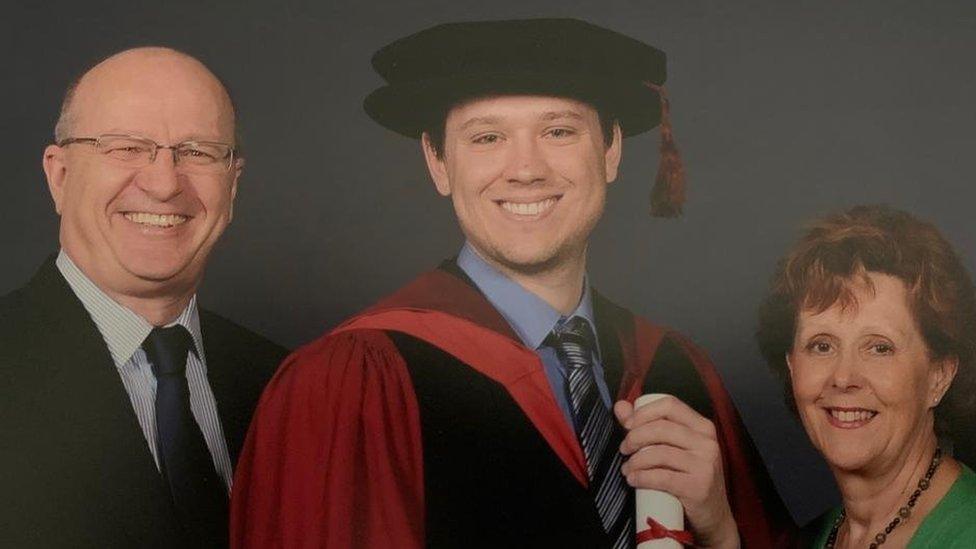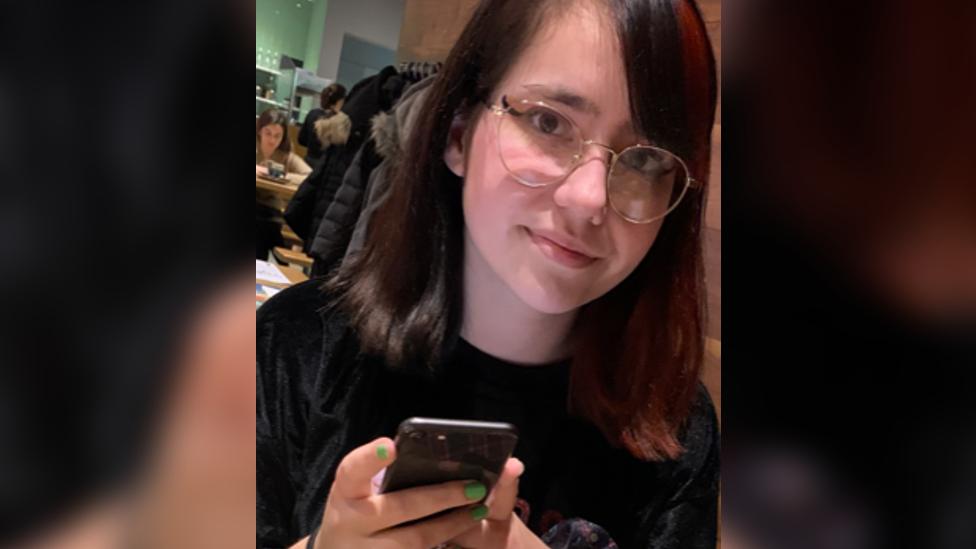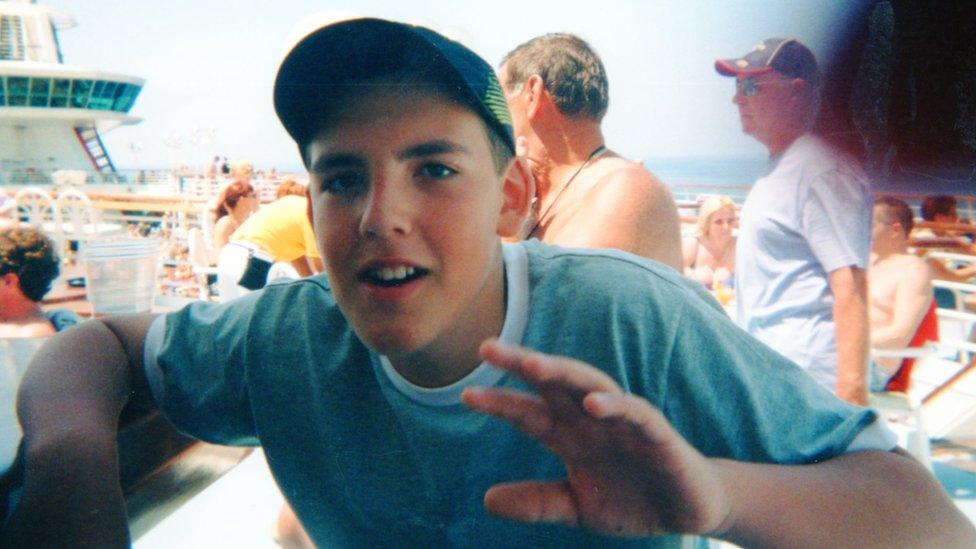Essex mental health services inquiry probes 1,500 deaths
- Published

Melanie Leahy, seen here with her late son Matthew, campaigned for the public inquiry but was now leading a boycott of it
A public inquiry has learned of the deaths of 1,500 people who were in the care of Essex mental health services over a 21-year period.
They were either inpatients or individuals who died within three months of being discharged.
Dr Geraldine Strathdee, chairwoman of the inquiry, said "at this stage we only know the causes of death in 40% of those people".
She appealed for more people to come forward.
The inquiry began taking evidence from the public in December and is ongoing.
So far it has heard from 14 families of those who have died, as well as other individuals.
Among the recurring themes have been concerns over patients' physical, mental and sexual safety while on wards, said Dr Strathdee.
She added a lack of basic information being provided to patients and their loved ones and "major differences in the quality of care" were also things she had repeatedly heard.
She said they had "limited information" about the deaths and they were "seeking further information rapidly so that we understand which of those 1,500 people will need further investigation".


Robert and Linda Wade described their son Richard as "a great son, a good friend. He was just a great lad"
'Richard's death was avoidable'
Richard Wade was aged 30 when he died at The Linden Centre in Chelmsford in May 2015.
He worked in the City of London and had a PhD in political science.
Richard was admitted to the centre over fears he would harm himself after a recurrence of the depression that he had previously suffered from.
His father Robert said "they left Richard with scissors, razors, shoelaces, electrical cords and a dressing gown cord".
His room was where someone else had taken their own life three months beforehand, but hazards in the room's layout were still in place.
"It's the same errors and the same flaws, time after time," he added.
"People are still dying and they're still dying needlessly."

The Essex Mental Health Independent Inquiry, external is the first of its kind in England and is investigating deaths between 1 January 2000 and 31 December 2020.
It was set up by then-health minister Nadine Dorries, external in January 2021 following a campaign led by Melanie Leahy, whose son Matthew died while he was a patient at the Linden Centre.
The Essex Partnership University NHS Foundation Trust (EPUT), which operated the unit, was prosecuted by the Health and Safety Executive (HSE) and admitted failings in the deaths of 11 patients in the care of one of its predecessor NHS trusts.
It was fined £1.5m in June last year over the deaths, which happened between 2004 and 2015.
Ms Leahy criticised the decision to place the inquiry on a non-statutory footing which means it cannot compel witnesses to testify or take evidence on oath.
It is being boycotted by Ms Leahy along with almost all of the families whose relatives were at the centre of the HSE prosecution.
She said: "The inquiry is futile. It doesn't even cover the community deaths. Are they not important as well?
"What about those who hadn't been an inpatient, who hadn't been discharged? Multiple people have been treated in the community and have been failed.
"We have offices in London jam packed with evidence. We urge the minister to call for the statutory powers and we will hand it all over."
Dr Strathdee said she had "no intention" of having an inquiry "that does not have impact and that does not lead to the changes needed".

Analysis by Nikki Fox, BBC East health correspondent
This inquiry into deaths at mental health trusts in Essex was announced after more than 100,000 people signed a petition calling for one on a full statutory footing.
That's not what they've got and critics say there is nothing to compel former staff to give evidence if they choose not to.
Its effectiveness rests on the affected relatives having faith that change will happen following inquest after inquest that have heard the same story.
Some families believe the full truth can only be revealed with witnesses giving evidence under oath.
Others say this non-statutory inquiry is at least a chance to ensure real change will happen.

EPUT is the current provider of NHS mental health services in the county and it was formed in 2017 following the merger of two separate trusts for north and south Essex.
Paul Scott, EPUT's chief executive, said: "We continue to support the ongoing inquiry and encourage service users, family, carers and staff to share their experiences with the inquiry team so they have a full picture to draw on to make their recommendations."
Dr Strathdee said that the inquiry needed people to come forward: "We appeal to anyone, whether in Essex or beyond.
"We want to hear your experiences and we want to hear your ideas."

Find BBC News: East of England on Facebook, external, Instagram, external and Twitter, external. If you have a story suggestion email eastofenglandnews@bbc.co.uk, external
- Published15 September 2021

- Published16 June 2021

- Published14 January 2021

- Published16 February 2022
